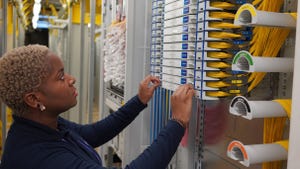Leading Lights 2019 Finalists: Most Innovative Automation Strategy
India's Reliance Jio and Japan's Rakuten make this year's shortlist for Most Innovative Automation Strategy.

Automation remains one of the buzzwords of the telecom industry as operators try to slash costs and improve customer services by phasing out more cumbersome manual processes. On the infrastructure and IT side, artificial intelligence, intent-based networking and the snappy sounding closed loop service assurance now hold out the promise of operations that are less bogged down by humans and all their various shortcomings.
It is not just about shoring up those unemployment statistics, though. Future 5G networks will be far too complex for humans to manage, say the companies designing those networks. The automation of dull and repetitive tasks will "free up" engineers and technicians for more exciting activities, such as buying coffee and playing Fortnite. It could also produce telecom organizations that never had many employees performing dull and repetitive tasks in the first place -- much as the Internet revolution gave rise to the likes of Amazon and Google.
Perhaps unsurprisingly, it is two such firms that make the shortlist for the Most Innovative Automation Strategy award: India's Reliance Jio Infocomm and Japan's Rakuten Mobile. Both operators have barged into bustling mobile markets in their respective countries and provided a blueprint for developing a highly automated network when legacy is not a constraint. Will investors in other parts of the world take note?
The winner will be announced at the Leading Lights Awards dinner, which will be held at the Pinnacle Club in Denver, on Monday, May 6, on the eve of the Big 5G Event. Find out about how to book a table and attend the awards dinner by clicking on this link.

Here are some details about the two shortlisted entries:
Reliance Jio Infocomm
RJio's impact on India's mobile market has been well documented. Since arriving on the scene in late 2016, it has become one of the country's biggest players and blamed for the disappearance of several older service providers. None of that would have been possible without RJio's development of a cutting-edge mobile network that almost runs itself and can activate and update services in a fraction of the time it would take a less automated company. Thanks to its investment in automation technologies, RJio has been able to reduce the number of people staffing its network operations center from 400 to only 25, for instance. And the time it takes to roll out a new enterprise service has fallen from 90 days to just three. It is no wonder that service providers around the world see RJio as an example of what is ultimately possible with automation.
Rakuten Mobile
One of the companies tracking RJio's progress is Rakuten, a Japanese ecommerce player that is now building a mobile network with the aid of some former RJio executives. That network, says Rakuten, will adopt 5G systems architecture from launch and be the world's first "cloud-native" network, fully virtualized and highly automated from the radio access network to the core. On the cost side, the reliance on "zero touch" automation systems promises a dramatic reduction in opex and time spent on technical activities. Rakuten believes the use of an open cloud platform architecture will lead to a 35% reduction in total cost of ownership, for instance. How it all works out, and what impact Rakuten will have on the Japanese mobile market, remains to be seen, but the company's network plans have set tongues wagging throughout the entire industry.
Related posts:
— Iain Morris, International Editor, Light Reading
Read more about:
AsiaAbout the Author(s)
You May Also Like












